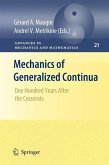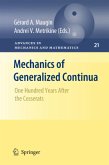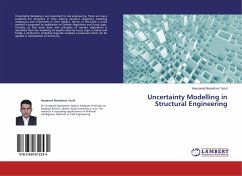The aim of this book is to provide a mathematical framework able to describe the irreversible behaviour of crystalline materials, based on the lattice defects like dislocations, disclinations and matter distribution defects (or point defects). The geometrical nature of the defects is physically motivated by the crystal lattice attached to material microstructure. The microstructural defects are modeled in terms of the differential geometry concept, following Kroner [1992], deWit [1981]. In our model the key point is given by the so-called plastic connection, which defines together with the plastic distortion the geometrical structure associated with dislocated plastically deformed material structure, see Cleja-Tigoiu [2007], [2010]. The curl of the plastic distortion is considered to be a measure of dislocations, while the second order tensorial field which enters the expression of plastic connection, through its curl, defines the disclinations.
Bitte wählen Sie Ihr Anliegen aus.
Rechnungen
Retourenschein anfordern
Bestellstatus
Storno








